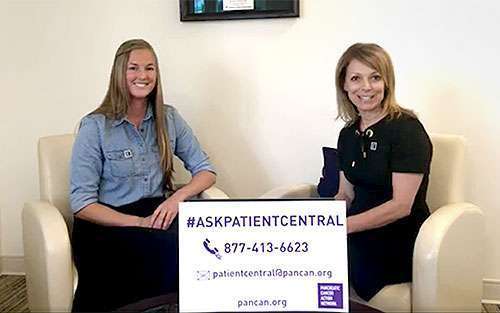
As part of our new series, “Ask PanCAN Patient Services,” where we ask a PanCAN Patient Services Case Manager a common question they get from patients and caregivers, we spoke with our Danielle Luce on Facebook Live about ways patients can reduce fatigue.
Both pancreatic cancer and its treatments can cause fatigue – an extreme lack of energy. Supportive care can help address fatigue, and PanCAN Patient Services can help provide fatigue and supportive care resources and information. Here’s what Luce had to say on the subject:
PanCAN: Let’s talk about fatigue associated with pancreatic cancer and treatment. Why is it a side effect and how many patients experience it?
Luce: Fatigue is a common side effect. More than half of patients experience some sort of cancer-related fatigue throughout their pancreatic cancer journey and this really can vary from individual to individual. For some, this may mean that they feel too tired to even get out of bed, whereas others may be able to continue their normal routine, but just feel slightly more tired throughout the day. This really plays into the fact that fatigue can be caused by a variety of different factors, whether it’s a symptom of the cancer itself, a side effect of treatment or both. This is what makes fatigue such a complex problem and can make it so difficult to treat.
One common physical problem that can lead to fatigue is anemia, which really just means that there’s not enough red blood cells to carry oxygen throughout the body, so organs don’t get the oxygen they need to function properly. Since chemotherapy can induce anemia, speaking with the doctor about the use of erythropoietins, like Procrit, to boost red blood cell production is a potential solution.
It’s also important to consider that your body might not be getting enough nutrients to fuel itself properly, so meeting with a registered dietitian can also be helpful to determine if there are any changes in diet or supplements that could help fight fatigue.
PanCAN: What are some other ways PanCAN Patient Services encourages patients to counter fatigue on their own, without the use of medication?
Luce: Keep up with good nutritional habits, which can include:
- Scheduling meals and snacks six to eight times per day
- Eating foods that do not require a lot of energy to prepare
- Maintaining adequate hydration
- Avoiding using caffeine, as it can cause more fatigue later in the day
Get rest, but not TOO much:
- Take several short naps or rest breaks throughout the day
- Make sure to get seven to eight hours of sleep every night
Stay active:
- Any activity, including talking short walks (if possible), is good exercise and may increase energy levels
- Break activity into small increments of five to 10 minutes, 30 total minutes per day, if possible; while the optimal amount of activity is 30 minutes per day, any activity is beneficial
- Increase activity over time, as tolerated
Save your energy:
- Ask family or friends to help with difficult tasks
- Try easier or shorter versions of the activities one enjoys
- Join a support group for others in your situation
PanCAN: People might think that fatigue is just part of the cancer experience. Is that always the case?
Luce: It doesn’t have to be the case! While many patients have fatigue, it’s important to know that it doesn’t have to be something you just “push through.” There are many options for managing it and so really the best place to start is working with the doctor, and preferably a palliative care specialist (a doctor that specializes in managing symptoms and side effects) to determine what they think the most-likely cause of the fatigue is, which will then help them determine the most appropriate treatment options. Treating fatigue can be difficult and so it can be the case that the first option doesn’t necessarily work for the patient.
PanCAN: What is the number-one thing for patients to know about managing their fatigue?
Luce: Knowing that just because you’re experiencing fatigue, doesn’t mean it always has to be this way. Incorporating the tips I mentioned earlier – and working with doctors to determine if there are any medications that might help – can minimize the fatigue you experience.
To learn more about managing fatigue, supportive care and any other pancreatic cancer topics, please contact PanCAN Patient Services.
















